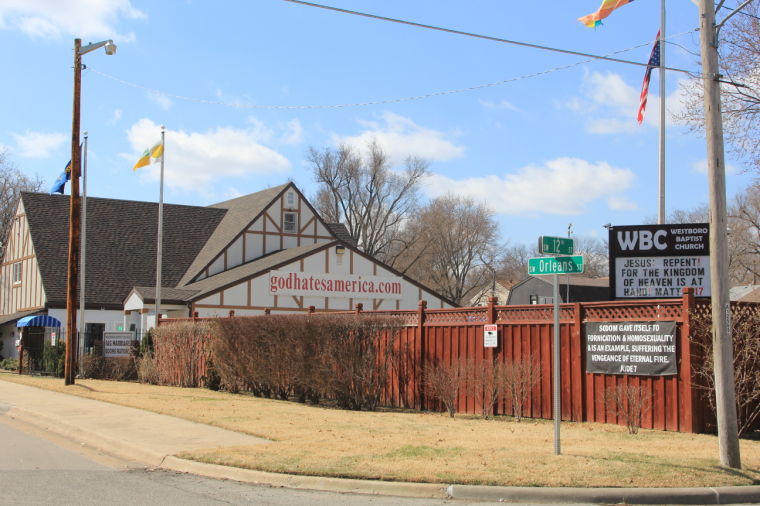Phelps Leaves Behind Infamous Legacy In Topeka
March 31, 2014
Fred Phelps, founder of the Westboro Baptist Church, died of natural causes at 11:15 p.m., March15 in hospice care. He was 84 years old. According to his son, Nathan Phelps, his father had been excommunicated from the church, he founded prior to his death.
Phelps was one of the most well- known residents of Topeka and has left an infamous legacy for his crusade against the LGBTQ community. Some argued that his crusade, while negative, brought positive outcomes to Topeka.
“I think that they [Westboro Baptist Church] forced Topeka first to look seriously at our intolerances and our prejudices and confront them and for some people to act and to change,” said Kim Morse, professor of history.
Phelps was born in Meridian, Miss., and originally planned to attend West Point before a sermon at a Methodist revival ceremony caused him to devote his life to religion. He founded the Westboro Baptist Church in Topeka, Kan. in 1955. His first major campaigns against homosexuals were aimed at Gage Park, where homosexuals allegedly gathered.
Phelps and his followers gained national attention in 1998 for their protests of Matthew Shepard’s funeral. Shepard, a student, was tortured and beaten to death outside of Laramie, Wyo., for being homosexual. Phelps’ protest gained media attention and sparked counter protests. Phelps also protested outside the trial of the two young men who murdered Shepard.
Phelps and his followers started to protest military funerals in the wake of September 11, 2001. The church claimed that God killed the soldiers for supporting a nation that condoned homosexuality. In 2001 the U.S. Supreme Court upheld Phelps and his followers’ constitutional right to picket the funerals of soldiers on free speech grounds. Phelps’ policy of protesting military funerals created solidarity in opposition to his cause between different groups.
“At some level the Phelps have been the best thing for gay activists and gay rights in terms of allowing the solidification of the unification of partners in rejection to what the Phelps stood for,” said John Paul, professor of sociology.
The Westboro Baptist Church became famous for protests that shocked and offended many. There were numerous negative responses from Americans who were hurt by the Phelps’ crusade. Although Phelps’ methods and methodology were seen as appalling to many, he and his church operated within the law. Phelps and his family had extensive legal experience.
Phelps earned a law degree from Washburn University School of Law in 1964. He became known for his work in civil rights cases in Kansas. He represented black clients in discrimination lawsuits. For years he was recognized for his contributions in the struggle for civil rights in Kansas.
he Kansas Board of Law Examiners filed a complaint November 8, 1977 against Phelps for his conduct in a lawsuit against a court reporter named Carolene Brady. He declared her a hostile witness, accused her of sexual perversions and of being a “slut.” Phelps was disbarred July 20, 1979, the result of his breach in professional ethics.
In 1989 Phelps surrendered his license to practice law in federal courts as the result of additional disciplinary complaints from U.S. District Court judges.
In recent years Phelps was not often seen at the protests, thought by many to be due to his age; however, many critics and academics noted a change in the church’s agenda. What was once a myopic and focused campaign against the LGBTQ community seemed to devolve into a less unified crusade against anyone outside the Westboro Baptist Church. The group’s website, www.godhatesfags.com, branched out to target new groups.
Some individuals speculated that Phelps was no longer in control of his church based on the deviation from his original crusade. His daughter Shirley Phelps-Roper appeared to be the head of the church as the most outspoken member in their recent campaigns.
The church’s campaigns against Obama contain passages that accuse him of being the antichrist and focus heavily on his African heritage. This new content appears contradictory, given Phelps’ past activism for African American civil rights.
Such evidence sparked speculations about a change in the church’s leadership. Nathan Phelps’ claim that his father was excommunicated prior to his death fits with the question of who now controls the church?
Steve Drain, a documentary filmmaker who is one of the few not descended from Phelps, has acted as the spokesperson of the church in the wake of Phelps’ death.
“Westboro Baptist is going to continue; what they do and how they do it remains to be seen,” said Morse. “No matter what, there is a family that is in mourning and we have to honor and respect that.”
Phelps’ death has brought renewed interest in his life, which is as complicated as it is infamous. His legacy can be seen as spreading hate, uniting various groups against his message or in the future of the church he founded. Regardless of how he is remembered it is unlikely he will be forgotten.



